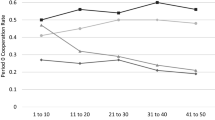Summary
A standard assumption on the Iterated Prisoner's Dilemma is that the probability of further interaction is constant. Then, cooperation via reciprocity can be guaranteed if and only if this probability is sufficiently high. In this paper we analyze a more realistic model: a discrete random variable, not necessarily geometric, governs the number of interactions. We obtain necessary conditions and sufficient conditions for reciprocal cooperation based on the use of TFT strategy by both players. The obtained conditions are particularized to classes of distributions with monotonous failure rate and to some relevant probability models.
Similar content being viewed by others
References
Aumann, R. (1981). Survey of Repeated Games. In:Essays in Game Theory and Mathematical Economics in Honor of Oskar Morgenstern. Bibliographisches Institut, Mannheim Wien Zürich
Axelrod, R. (1984).The Evolution of Cooperation Basic Books. New York.
Axelrod, R. and D. Dion (1988).Annotated Bibliography on the Evolution of Cooperation. Institute of Public Policy Studies. University of Michigan. Ann Arbor
Boyd, R. and J.P. Lorberbaum (1987). No Pure Strategy is Evolutionarity Stable in the Repeated Prisoner's Dilemma GameNature 327, 58–59.
Farrell, J. and R. Ware (1989). Evolutionary Stability in the Repeated Prisoner's Dilemma.Theoretical Population Biology 36, 161–166.
Kalai, E., D. Samet and W. Standford (1988). A Note on Reactive Equilibria in the Discounted Prisoner's Dilemma and Associated Games.International Journal of Game Theory 17 (3), 177–186.
Manuel, C.M. (1992).Juegos Finitos Iterados con Horizonte Estocástico. Universidad Complutense de Madrid Press. Madrid.
Manuel, C.M. and J. Tejada (1994). On random Horizon Repeated Games. Technical Report 1/1994. Department of Statistics and Operational Research. University Complutense of Madrid.
May, R.M. (1987). More Evolution of Cooperation.Nature 327 (7), 15–17.
Mesterton-Gibbons, M. (1992). On the Iterated Prisoner's Dilemma in a Finite Population.Bulletin of Mathematical Biology 54, 423–443
Molander, P. (1992). The Prevalence of Free Riding.Journal of Conflict Resolution 36, 756–771.
Taylor, M. (1987).The Possibility of Cooperation Cambridge University Press. Cambridge.
Author information
Authors and Affiliations
Rights and permissions
About this article
Cite this article
Manuel, C.M., Tejada, J. Reciprocal cooperation in the Prisoner's Dilemma repeated with random horizon. Top 3, 97–116 (1995). https://doi.org/10.1007/BF02574805
Received:
Revised:
Issue Date:
DOI: https://doi.org/10.1007/BF02574805




